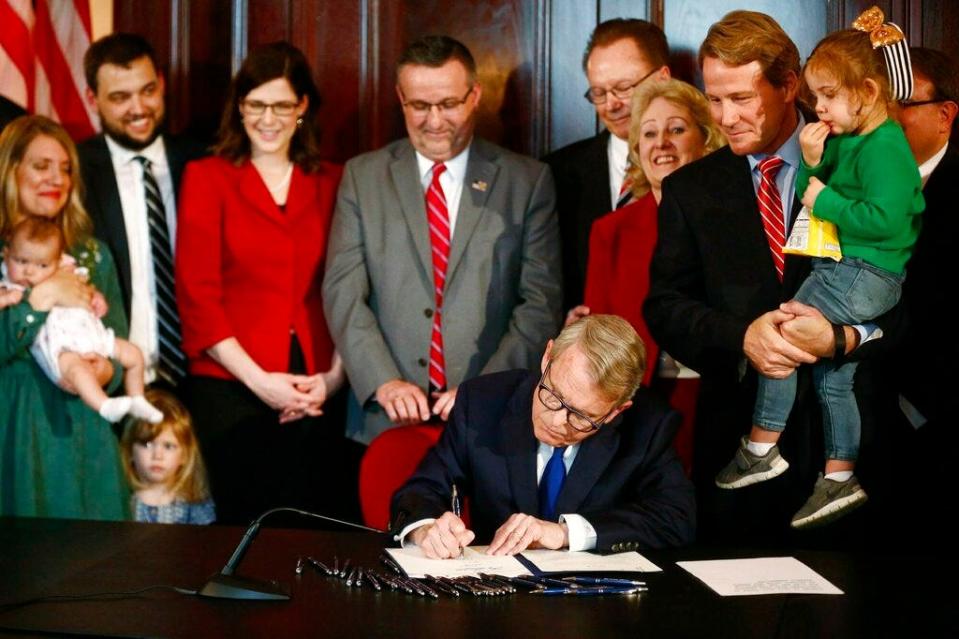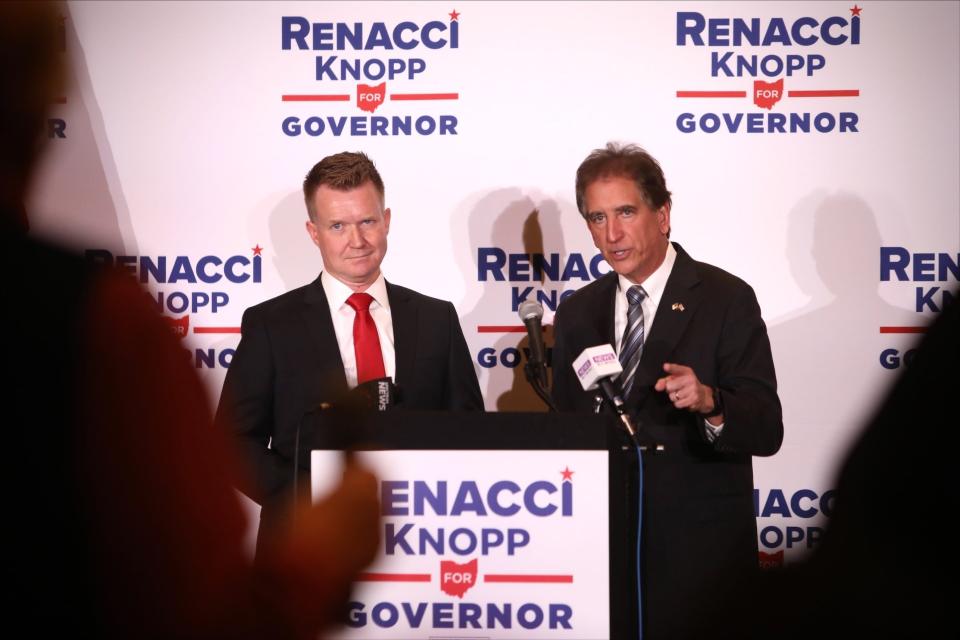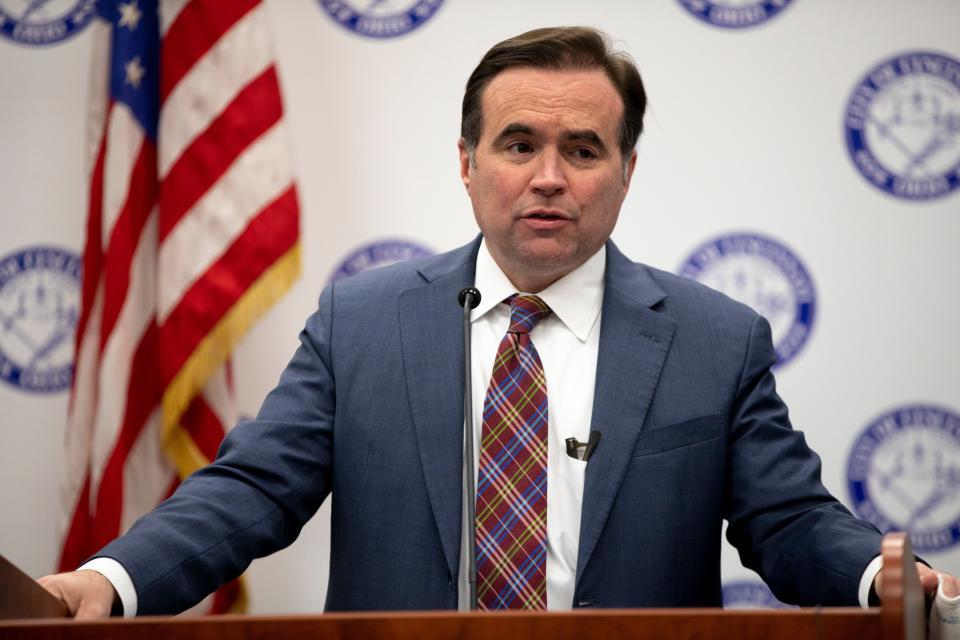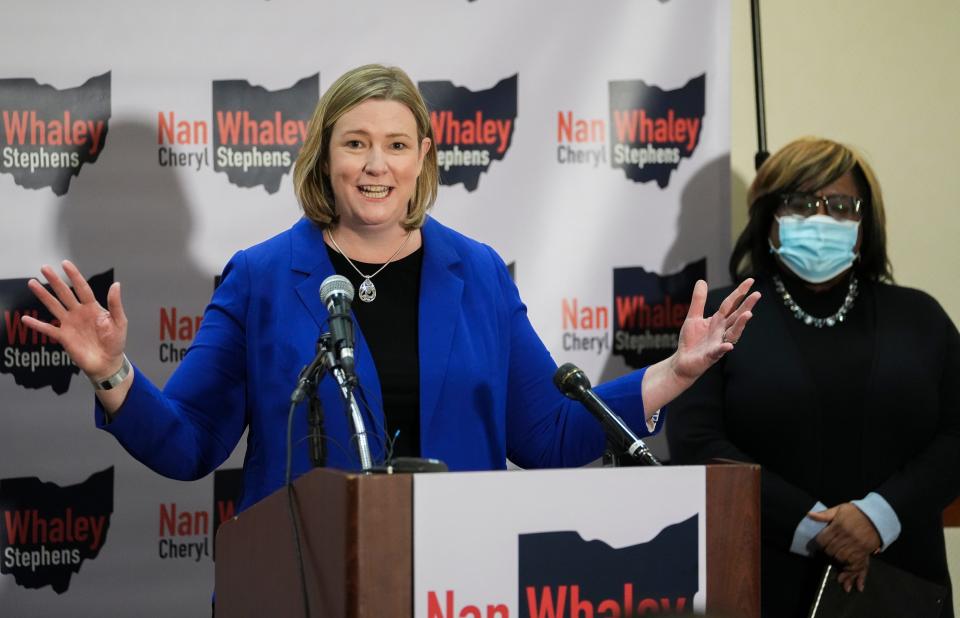With U.S. Supreme Court decision looming, abortion access in Ohio is on the ballot
- Oops!Something went wrong.Please try again later.
- Oops!Something went wrong.Please try again later.
- Oops!Something went wrong.Please try again later.

As the landmark abortion decision Roe v. Wade hangs on by a legal thread, access to abortion in Ohio could depend on who holds the governor's pen next.
That has led to a heightened focus on abortion access in both the GOP and Democratic primaries for governor – but for different reasons.
Gov. Mike DeWine has a history of signing every abortion restriction that crosses his desk. But GOP challengers are trying to paint DeWine as soft on the issue for decisions like selecting Dr. Amy Acton, a Democrat, as his health director.
Meanwhile, former Dayton Mayor Nan Whaley is pointing to Democratic challenger John Cranley's history of "pro-life" stances. And Cranley is trying to boost his "pro-choice" credentials with running mate Sen. Teresa Fedor, who has consistently backed abortion access.
Ohio reported 20,605 abortions in 2020, a 3% increase from the previous year, according to Ohio Department of Health data. Several abortion clinics have closed in recent years, leaving six that offer surgical abortions and another three that offer medication abortions.
The fight over who is pro- or anti-abortion access enough couldn't be starker than in the primary races. And the stakes are high as the U.S. Supreme Court reviews a Mississippi abortion ban that could send decisions about when and where abortion is permitted back to the states.
Is DeWine anti-abortion enough?

As governor and in his past political posts, DeWine has been a reliable supporter of abortion restrictions. DeWine's team has dubbed him as "the most pro-life governor in Ohio history."
Since taking office, DeWine has signed bills to ban abortion as early as six weeks gestation, to require aborted fetuses be buried or cremated, to prevent medication abortions via telemedicine and to add rules that could shutter two Southwest Ohio abortion clinics.
Before that, he led an investigation into Planned Parenthood as the state's attorney general. He argued in the 2014 Hobby Lobby case that businesses shouldn't have to provide birth control under Obamacare that violates their religious beliefs.
"Mike DeWine has always been there on life. He's never wavered, never once in his entire political career," said Mike Gonidakis, president of Ohio Right to Life, which has not yet endorsed a candidate in the GOP primary.
But DeWine's opponents say he hasn't done enough to restrict abortion in Ohio.
The Right to Life Action Coalition of Ohio rescinded its endorsement of DeWine in November 2020 over his appointment of Acton, a polarizing leader early in the COVID-19 pandemic, and the governor's short-lived pick Dr. Joan Duwve. Duwve served as a volunteer coordinator for Planned Parenthood for seven months in the 1980s – a detail conservatives quickly cited as a disqualifying factor. Dr. Bruce Vanderhoff now leads the Ohio Department of Health.
Ohio politics: Why it's so hard now to find an Ohio health director
The coalition also criticizes DeWine for allowing abortion clinics to remain open amid the COVID-19 pandemic when the state health department halted elective surgeries and closed many businesses as part of its stay-at-home order.
Former U.S. Rep. Jim Renacci's running mate, Joe Knopp, reiterated that criticism: “The church I attend in Dayton, Ohio, is two miles down the road from the abortion clinic. I wasn’t able to attend my church during COVID, however, the abortion clinic was open the entire time and that was his responsibility."

Abortion clinics were open in Ohio because of a federal judge's order. After Ohio Attorney General Dave Yost ordered several clinics to halt "nonessential" abortions, the clinics sued. A judge ruled that doctors could determine on a case-by-case basis whether a surgical abortion was necessary, for example, to protect the patient's health or life.
Still, Renacci pointed to the rescinded endorsement as proof that DeWine could be doing more to close abortion clinics in Ohio. “Take all the right to life organizations that don’t have a conflict and they all rescinded the right to life endorsement," he said.
If ever there was a time for ideological purity on abortion, it's now because of the looming U.S. Supreme Court decision, advocates on both sides of the issue said.
"I don’t think there’s a time when it’s been more important to the citizens in Ohio," said Molly Smith, past president of the Right to Life Action Coalition of Ohio. "It’s going to be very, very topical. I think our endorsement is going to hold a lot of water."
To prepare for the high court's ruling, abortion opponents are pushing for a "trigger law" that would ban abortion in Ohio if Roe v. Wade were overturned.
Abortion in Ohio: New Ohio bill would ban abortion if Supreme Court empowers states to decide
But DeWine didn't offer a resounding endorsement of the bill, instead saying in a recent interview: "I think it's wise for us, prudent for us, to wait until we have instructions from the United States Supreme Court."
Is Cranley pro-abortion access enough?
On the other side of the political aisle, a different battle is being waged over abortion. Former Cincinnati Mayor John Cranley, a Catholic who once labeled himself "pro-life," now says he would be "the pro-choice governor that Ohio needs now more than ever."

Advocates for abortion access, including Pro-Choice Ohio and EMILY's List, have endorsed Cranley's primary opponent, former Dayton Mayor Nan Whaley, instead. They praised Whaley's consistent advocacy on the issue and her defense of the Dayton area abortion clinic, which has frequently been in the state's crosshairs.
"Given everything that’s happening both at the U.S. Supreme Court and Ohio Statehouse, we need a passionately and proactively pro-choice governor," said Kellie Copeland, executive director of Pro-Choice Ohio. "You stand with those who have been with you."
Jason Williams: Why abortion could be key in 2022 Ohio Democratic gubernatorial primary between Cincinnati, Dayton mayors
EMILY's List put it more bluntly: "Cranley is seeking to gloss over his prior anti-abortion statements with the hope that Ohio voters will forget about his past. We know the truth: John Cranley is as much a threat to abortion access and reproductive health care as Ohio’s Republican General Assembly."
In the early 2000s, Cranley voted with Republicans on Cincinnati City Council to exclude most abortion coverage from city health insurance plans. An arbitrator ruled in 2004 that the ban violated the city's union contract, the Enquirer reported.
Even Gonidakis with Ohio Right to Life said the organization "briefly considered" endorsing Cranley in the Democratic primary "based on his long-standing pro-life beliefs. Sadly, with his pick of pro-choice Sen. Teresa Fedor, we no longer could consider his candidacy.”

Cranley recently announced Fedor as his running mate, a move that could help to shore up his support with those wary of his pro-abortion access credentials.
"I would not be standing next to John Cranley as governor and running as his lieutenant governor candidate if he wasn’t pro-choice, period," said Fedor, citing recent actions like Cincinnati joining a legal brief in opposition to the Mississippi ban.
Ohio governor's race: Cranley selects Sen. Teresa Fedor, Whaley picks Cheryl Stephens as running mates
During an emotional debate on the House floor in 2015, Fedor shared that she had an abortion after she had been raped while in the military. Many abortion restrictions in Ohio do not have an exception for rape or incest.
"We all know that reproductive freedom is on the ballot this year, and it's very likely that Roe v. Wade is going to be repealed by the Supreme Court," Cranley said while announcing Fedor as his running mate. "And when we face Mike DeWine and Jon Husted or Jim Renacci in the fall, they're going to have to confront my lieutenant governor who, if they had their way, she or her doctors would be in jail."
Copeland called Fedor a "phenomenal advocate" for abortion access. Noted feminist Gloria Steinem, a Toledo native, endorsed the Cranley-Fedor ticket. Voters will decide whether that's enough to overcome Cranley's history on the topic.
"Prior to him running, this is not an area where he has been active," Copeland said. "This is not an area where he’s spoken out and been supportive."
And as Democratic voters look at their gubernatorial options this spring, Whaley is happy to remind them: "Abortion is on the ballot in 2022."
Jessie Balmert is a reporter for the USA TODAY Network Ohio Bureau, which serves the Akron Beacon Journal, Cincinnati Enquirer, Columbus Dispatch and 18 other affiliated news organizations across Ohio.
Get more political analysis by listening to the Ohio Politics Explained podcast
8505809002
- Embed
- Not set
- Not set
- Not set
- 10/18/21 9:32:54 AM
- Not embargoed
embed:
Return to Asset Tab
No caption
No credit
SEO Warning
Layout Priority
This article originally appeared on The Columbus Dispatch: Election 2022: Roe v. Wade uncertainty makes abortion key Ohio issue

